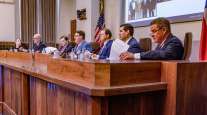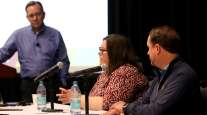Most Americans Support Usage Fees to Fix Crumbling Roads, Survey Shows

Nearly two-thirds of Americans would support roadway user fees to help fix the country's crumbling transportation infrastructure, according to a survey to be published April 28 that was seen by Reuters.
Options include paying for the number of miles a vehicle travels, according to the survey conducted by Kelton Global for HNTB Corp, a transportation consulting firm that works on such projects as managed lanes and mileage-based user fees.
The online survey of 1,002 Americans over 18 years old was conducted between March 14 and 22 using e-mail invitations. The margin of error is about 3.1%.
It is widely acknowledged both inside and outside of government that the country's roads, bridges and other surface transportation infrastructure is in dire need of repair.
But the gasoline taxes that historically paid for maintenance are waning because of more efficient vehicles, changing driving habits and state and federal gasoline tax rates that have not kept pace with inflation.
The cost to repair and upgrade the U.S. surface transportation system to meet current and future demands is in the "hundreds of billions of dollars," the U.S. Government Accountability Office said last year.
With gasoline taxes lagging, the federal Highway Trust Fund has needed an infusion of about $143 billion since 2008 to maintain a positive balance, according to a U.S. Congressional Budget Office report in February. The federal gasoline tax was last raised in 1993 to 18.4 cents per gallon.
The report said that total federal spending on highways buys less now than at any time since 1993. It used numbers adjusted for increased construction costs, which rose much more rapidly than prices in the economy as a whole over that period.
Many states, which use both their own and federal money to build surface transportation, have been searching for new funding streams.
"More and more people realize that road-usage fees options, such as vehicle miles traveled or price managed lanes, are needed to fill the gaps," Matthew Click, HNTB national director of managed lanes, said in a statement.
Charging drivers to use roads has raised privacy concerns, depending on the method used to track mileage, the CBO noted.
The approach may also place a bigger burden on low-income households and cause resentment among drivers who believed their taxes already paid for roads, the CBO said.
The state of Oregon launched a voluntary program last year to charge 1.5 cents per mile driven. California plans to begin testing a similar pilot program this year.




